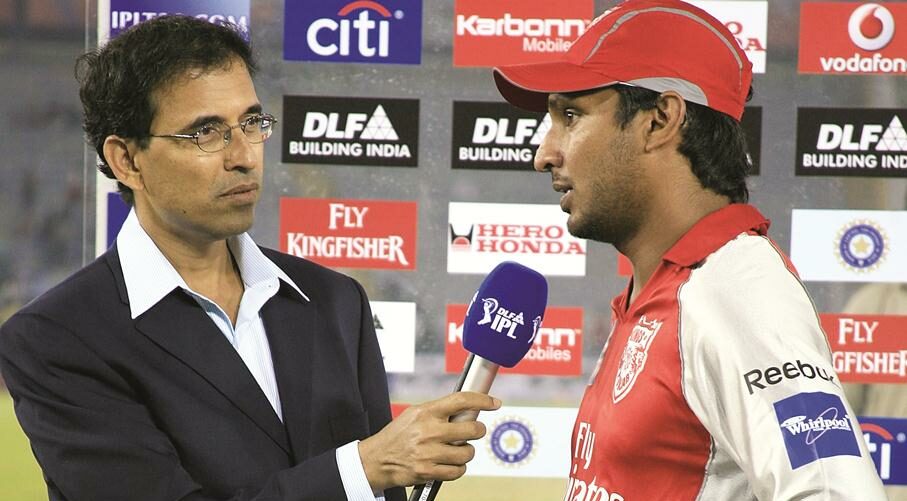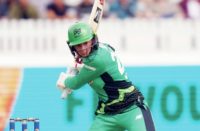By Adam Collins
There is no bigger name in Indian cricket – beyond the 22 yards that matter most, of course – than Harsha Bhogle.
From commentary boxes around the world, he has been a fixture as the voice of the game in the country for the better part of three decades.
The loyal eight million twitter followers that Bhogle boasts gives some sense of the man’s influence and standing. But, as he explains, the secret to success for this veteran freelancer has been his willingness to move with the times and to continue diversifying.
How precious is that to you being considered the voice of the game in India?
It helps me enormously because it allows just a simple storyteller of a cricket match to earn a very good living. I mean, at the end of the day, what do broadcasters do? We go to the cricket match and tell people what happened. You can judge the mood of the nation, certainly since the arrival of social media, on the way the Indian cricket team has played. I used to say that if Tendulkar played well then India sleeps well, that was a slight exaggeration but it is like that: if India have done well then everybody is happy.

How big a part of your upbringing in Hyderabad was cricket for you?
My mother tells me that I would talk to her about cricket when I was four years old and I do remember reading cricket magazines from when I was six. My turning point came when I was picked, rather luckily, for the school junior cricket team. I am not sure if I was good enough but I held all my catches and those who held catches got selected. I played for my school team for three years and lower division cricket in Hyderabad then senior division cricket for my college and university and playing against Ranji Trophy cricketers, so I understand the pain, the joy, the disappointment, the happiness – all those emotions that come with the game – if not the technique that comes with it.
You were commentating on radio from when you were a teenager. How did you learn what can be quite a difficult craft?
Purely by making mistakes. But how I got the opportunity was a different story. There was an under-19 Test match and my father said to me ‘don’t you think an under-19 Test match should have an under-19 commentator?” So, I took two buses in the afternoon heat and I went there and this very amused producer heard my request. As it happened, players like Derek Pringle were in that side and they were very kind to me. We didn’t have teachers, gurus or anything like that, we learned completely on instinct. I learned in broadcasting and in life making a mistake once is allowed but twice it isn’t so the moment you made one, you learned. Exactly the same thing happened in television. Nobody told me that I would have an earpiece in my ear with a director talking while I was speaking.”
Speaking of TV, that came next in 1995. It was your big break?
I benefited enormously from working with the ABC, so the BBC thought I was good enough to get a gig for the World Service. There, I learned timing. I learned what 45 seconds was, what a minute and a half was. They were magnificent to me. Then, when TWI came to Australia I had already done ABC and BBC so I had qualifications, which is what allowed them to get me into television. With hosting I had no clue in 1995; no clue what to expect.”
Press fast forward and we reach the IPL. After taking a job with Mumbai Indians behind the scenes in season one, you were the host of the competition until 2016. Was it the most nourishing time in your career with Indian cricket being cast in this new light?
My best years in broadcasting were 2000-2006 as it coincided with the peak of a wonderful set of players who didn’t ask me why I was saying what I was saying on air; they were people I could trust. Ganguly, Dravid, Laxman, Tendulkar, Kumble – they are still people I can call up and have a meal with, they are still friends. The coming of the IPL was something I had been dreaming of for a long time and has changed Indian cricket so much. Before the IPL, 15 or 20 people made a proper living from the game in India. It has changed the lives of so many.

How possible is it to have a career arc like yours? Or do you need to have played for your country to get an opportunity now? If so, is that to the detriment of broadcasting?
On television in our part of the world, no chance. I am the last of my type – there will never be another me. It is impossible. But all over the world, we are selecting broadcasters based on how much cricket they have played. I can understand that if they are equally good storytellers; you look at a Nasser or Atherton or Holding or Ganguly – they are all perfectly good at telling their stories. But several times, people are picked who can’t tell stories and have such a close bond with the team and the game that they don’t know what the outside world is looking for. Someone like me will never get the opportunities that I have got, I was very lucky to come in at the time that I did.
You’re a bestselling author on leadership in the corporate world. Will you always be the same feisty freelancer or can you imagine leaving the game at some stage entirely?
I enjoy my time away and increasingly I find that the hectic schedule takes its toll, but I couldn’t dream of a life without cricket. I like going to England and I’ll do Australia but I’m starting to figure out how much I want to do. As a freelancer, it takes a long time to pick and choose – you don’t know if you’ll always have that option! People laugh when I tell them that – they think I’ll always have the option – but I am not as certain.”















